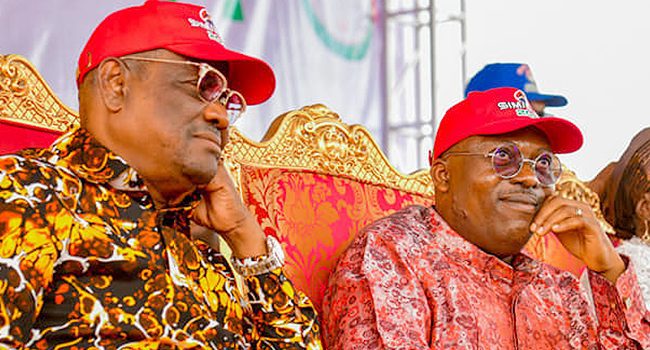Nyesom Wike, the former governor of Rivers State and current Minister of the Federal Capital Territory, once stood as an undisputed titan in Nigerian politics. His fiery rhetoric, decisive action, and apparent political foresight earned him the moniker “Rivers Strongman.” He was a master at wielding power, his influence stretching far beyond the boundaries of his oil-rich state. But in recent months, the edifice of Wike’s political invincibility has shown alarming cracks, laid bare by a bitter and public battle with his own godson and successor, Governor Sim Fubara. This clash is not merely a personal spat; it has become a microcosm of larger political dynamics and a turning point in Wike’s own narrative.
The Roots of the Rift:
The seeds of discord were sown during Wike’s gubernatorial tenure. While he enjoyed considerable success in infrastructural development and governance, his style was characterized by a centralization of power, a tendency to sideline potential rivals, and a fierce loyalty to his inner circle. Fubara, a loyal protégé, seemed destined to inherit this mantle. However, as Fubara assumed the governorship, cracks began to appear. The new governor, while acknowledging Wike’s contributions, sought to chart his own course, emphasizing inclusivity and a more collaborative approach. This perceived deviation from the Wike playbook sparked tensions, which quickly escalated into a full-blown political war.
The Battleground: Rivers State:
The battleground for this war is Rivers State, a volatile political landscape where oil wealth and ambition intertwine. Wike, accustomed to wielding absolute control, saw Fubara’s independent streak as a challenge to his authority. He accused his former deputy of ingratitude and attempted to exert his influence through loyalists in the state assembly and local party machinery. The ensuing power struggle has been messy, characterized by defections, resignations, impeachments, and even demolition of the state assembly complex.
The Cracks in the Armor:
This public brawl has exposed several vulnerabilities in Wike’s previously impenetrable image. His “strongman” persona, once admired for its decisiveness, now appears rigid and intolerant of dissent. His accusations of ingratitude ring hollow given his own past political maneuverings. The crisis has also revealed the limitations of his control over the Rivers political landscape and his carefully constructed network of loyalists seems to be fraying.
A National Spotlight:
The Wike-Fubara saga has transcended the boundaries of Rivers State, becoming a national spectacle. It has exposed the pitfalls of excessive power consolidation, the dangers of unchecked ambition, and the fragility of even the most seemingly assured political alliances. It has also served as a cautionary tale for other strongmen figures, demonstrating that the tide can turn swiftly in the ever-changing currents of Nigerian politics.
The Future of the Rivers Strongman:
The outcome of this battle remains uncertain. Wike, with his vast resources and political experience, is a formidable opponent. However, the public perception of his invincibility has been shattered. Fubara, riding a wave of public sympathy and the desire for change, represents a new generation of leaders. The future of Rivers State, and perhaps Wike’s own political future, hangs in the balance.
Beyond Rivers:
The Wike-Fubara saga has implications that extend beyond Rivers State. It reflects the broader challenges facing Nigerian politics: the need for power decentralization, the importance of inclusivity and collaboration, and the vulnerability of political figures to the tides of public opinion. It serves as a reminder that no political figure is invincible, and that even the strongest edifices can crumble under the weight of internal contradictions and external pressures.
The demystification of Nyesom Wike is not simply a personal story of political ambition and betrayal. It is a window into the evolving dynamics of power in Nigeria. It is a reminder that political dominance, however absolute it may seem, is rarely permanent. And it is a cautionary tale for all who seek to wield power: true strength lies not in control, but in adaptability, collaboration, and the willingness to embrace change. Only time will tell whether Wike can mend the cracks in his armor and regain his former stature, or whether he will be relegated to the pages of history as a fallen strongman, a victim of his own ambition and the changing tides of Nigerian politics.




 Premier League
Premier League